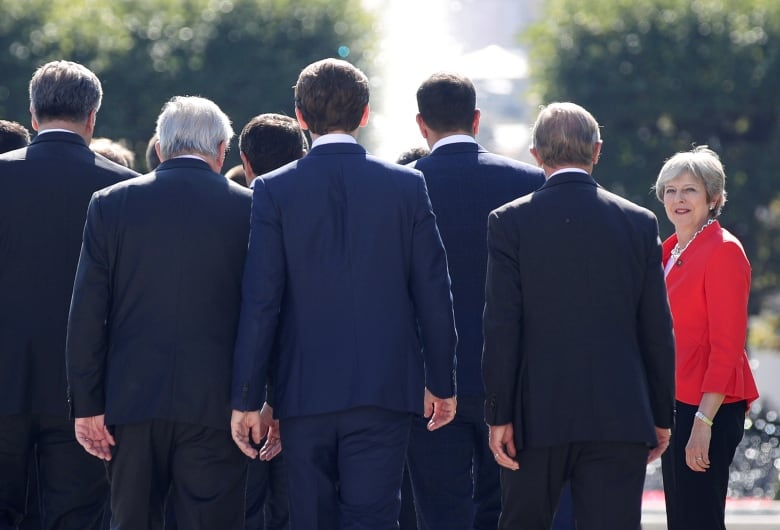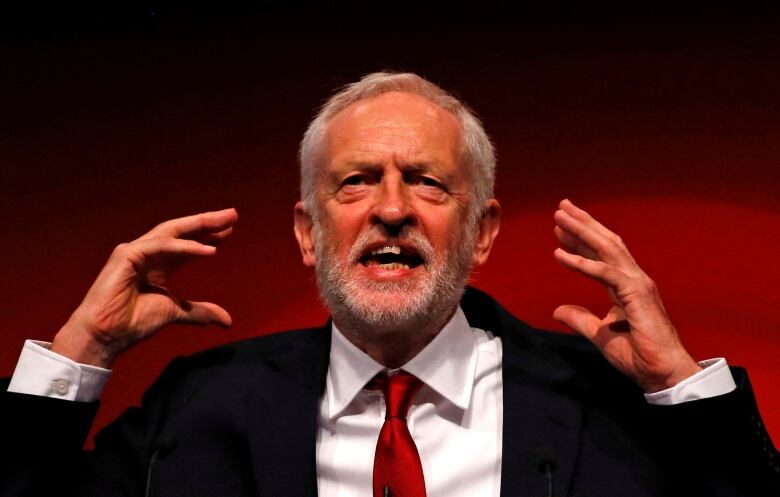Can Britain avoid the trauma of crashing out of the EU without a deal?
Public anxiety growing over U.K. plans to depart European Union in 6 months
Picture it. Six months to go before Britain is scheduled to leave the European Union and the British government feels compelled to appoint a new "food supplies minister" amid growing fears of shortages in the event Westminster can't agree on the final exit terms with Brussels.
That was never the plan. But as the United Kingdom seems to sink into an ever deeper and mind-numbing vortex of Brexit uncertainty, confusion and old-fashioned political opportunism, it is on the table as a real possibility.
The government has even been releasing batches of "no-deal papers" outlining contingency planning for all sorts of doomsday scenarios, from delays in medicines arriving to U.K. shores to potential holdups at borders for British travellers heading in the other direction. There might even be delays for their furry friends, normally used to travelling with the ease of a valid EU pet passport.
Some pundits have dismissed the release as a negotiating tactic by British Prime Minister Theresa May, eager to impress upon EU negotiating partners that she means it when she says "no deal is better than a bad deal."

But it has also upped anxiety over Brexit to new levels among the general public, feeding life into demands for another "people's vote" on the decision to leave the European Union. The first one, back in 2016 in a non-binding referendum, delivered a narrow majority of 51.9 per cent to those wanting out.
The stakes are high. More than 40 per cent of British exports go to the EU, according to Britain's Office for National Statistics.
And a recent survey reported in the Independent newspaper warned that one in 10 U.K. businesses says customs delays of up to half an hour at ports like Dover and Calais could push them into bankruptcy.
- Theresa May puts on defiant face despite blistering media reaction over EU rejection
-
Irish border highlights differences that remain between Britain, EU on Brexit deal
The two sides have already agreed on a number of key points, including a nearly two-year transition period to help ease the divorce and all the bureaucratic and regulatory change that will come with it.
But that transitional period remains entirely conditional on a formal withdrawal agreement being in place. Without it, many fear Britain's exit from the EU will be like falling off a cliff.
With exactly half a year to go to the March 29, 2019, deadline for the U.K. to leave, here are five things that could scupper or delay a deal.
1. The Chequers plan: Opposition from across the Channel
May has pinned her hopes on something called the Chequers plan, a negotiating strategy named after the prime minister's country home where it was hammered out with her cabinet back in July.
At its heart is a proposal for a "common rulebook" to replace the existing regulatory framework with the European Union for the trade in goods.
The idea would be to keep trade with the EU as frictionless as possible while freeing up Britain to negotiate its own trade deals with third countries. It would also see the U.K. avoid key tenets of the EU's single market, such as guaranteeing the free movement of labour.

But the EU has been telling May for months it won't fly, most recently at a summit in Salzburg that delivered May a bloody nose in the headlines. EU leaders say it would undermine the single market, a cornerstone of the political and economic union.
"If we give the idea that we can exit the European Union and keep all of the benefits of the single market then it is the end of Europe," French Finance Minister Bruno Le Maire said this week.
"To put it bluntly, what is more important for us than the future of the U.K. is the future of Europe. And so we will take no decision that could weaken the future of the EU."
2. Opposition from within: May's hardline Brexiters
Hardline Brexiters within May's own governing Conservative Party have also rejected Chequers as unworkable. They say it would still subject the United Kingdom to "domination" by Brussels.
Both May's Brexit secretary, David Davis, and her foreign secretary, Boris Johnson, resigned over it, leading to much speculation that Johnson is still hoping for a chance to bring down May and take over the top job.
The former London mayor has since returned to editorializing in the Daily Telegraph, where he has published his own Brexit Strategy just ahead of the Conservative Party's annual convention set to begin Sunday in Birmingham.

In it, Johnson champions a "Super-Canada" deal along the lines of the EU-Canada accord, which took seven years to negotiate.
"There has been a collective failure of government and a collapse of will by the British establishment to deliver on the mandate of the people," he wrote in the Telegraph.
"The heart of the new relationship should not be Chequers, but a free trade agreement at least as deep as the one the EU has recently concluded with Canada."
May is already on the record rejecting a Canada-style accord, saying it would not produce "frictionless trade."
But it's still a headache for May, who will need the hardline Brexiters to push any deal she does reach with the EU through Parliament.
The Canada deal was designed for two countries this far apart in terms of trade, to bring them closer together. For two parties already aligned as the UK & EU are, it would be disaster, moving us further apart.<br>🎥 <a href="https://twitter.com/cbicarolyn?ref_src=twsrc%5Etfw">@cbicarolyn</a> <a href="https://t.co/BpYDkUshlD">pic.twitter.com/BpYDkUshlD</a>
—@CBItweets3. Opposition from without: The Labour Party and Jeremy Corbyn
Given the problems in May's own party, it's also unlikely she could push a deal through Parliament without help from Labour, which has in the past said it is committed to honouring the results of the 2016 vote.
But the Labour Party, too, is proving just as capable of devouring itself from within as the Conservatives. Labour delegates meeting in Liverpool last week at their own annual meeting backed a resolution for another public vote on Brexit if Parliament rejects May's deal.
Senior party figures disagree over whether that vote should be on the merits of a deal or include the option of staying in the European Union.

But Labour Leader Jeremy Corbyn delivered his own bottom line in a keynote address where he said Labour will vote against the Chequers plan unless there are substantial changes to it, including Britain remaining in a customs union with the European Union and better guarantees for consumer standards and workers' rights.
"If you can't negotiate that deal, then you need to make way for a party that can," he said to May in a speech channelling hopes for a snap election ahead of — or in the event of — a Brexit collapse.
4. Northern Ireland
There are few more potent symbols of the long, if still sometimes uneasy, peace between Ireland and Northern Ireland in the wake of the Good Friday Agreement than the normalization of the land border between them.
What happens when Northern Ireland turns into the U.K.'s only land border with Ireland — and so the European Union — is one of the most intractable problems of the current exit negotiations.

Ireland insists that in the event of a no-deal, the border must remain open, without all of the past demons of "the Troubles" that a new hard border customs and security infrastructure might invoke.
The European Union says that would require a special regulatory deal for Northern Ireland to avoid the need for a hard border.
The May government rejects that proposal as unworkable, one that would hive off a part of the United Kingdom for special treatment. There are then domino fears that might potentially encourage pro-remain Scotland, for example, to demand special arrangements of its own.
5. Is there enough time?
The time pressure facing negotiators comes down to a desire to give British and European parliaments time to scrutinize any agreement reached. The original hope was that a deal could be presented at the EU's upcoming Oct. 18 summit.
There is nothing to stop May from requesting an extension of the negotiations, although it would require the consent of all 27 of Britain's EU partners.
- U.K. prime minister says no, again, to 2nd Brexit vote
-
British government ramps up warnings to businesses in event of 'no-deal' Brexit
It might be domestically difficult for her to do so given the pressure her leadership is under within her own party.
But there are also plenty who warn that she would be ill-advised to ignore the pressures building well beyond those walls, spilling out into the streets and a population increasingly baffled and bewildered by what Brexit will mean for them.


